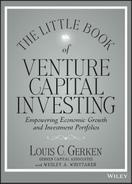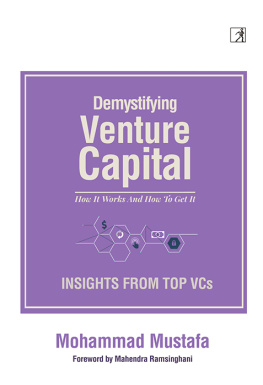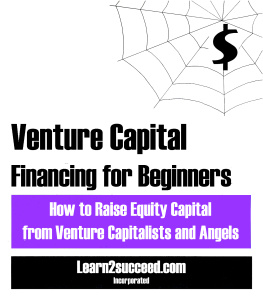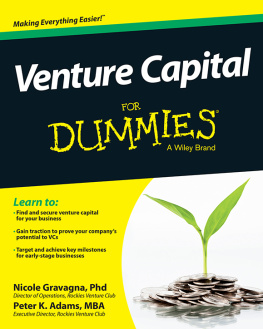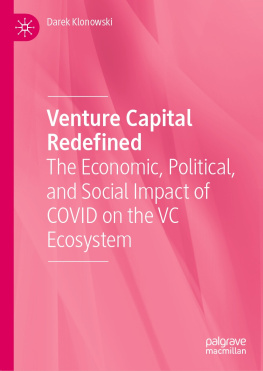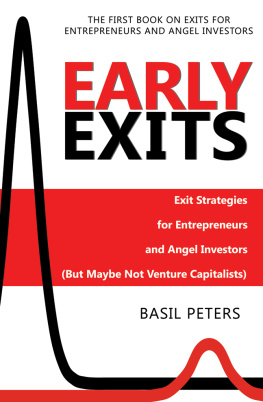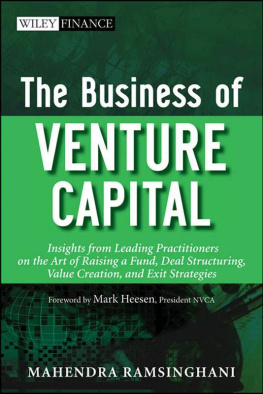About the Authors
Louis C. Gerken founded San Francisco Bay Area-based Gerken Capital Associates (GCA) in 1989. GCA is an independent, alternative asset fund manager and advisor. Prior to forming GCA, Mr. Gerken was Managing Director and Group Head of Prudential Securities Technology Investment Banking Division, and earlier a General Partner with Prudential Securities Prutech Venture Capital Funds. As one of the largest U.S. venture capital funds, Prutech was responsible for completing over 50 IT and biotech sector early- and expansion-stage investments, and was one of the first VC funds to pioneer corporate partnering as a co-investment strategy. Prior, Mr. Gerken oversaw VC activities for Wells Fargo Bank, where he launched one of the very first U.S. fund of funds. Mr. Gerken is a father of one and resides in the Bay Area.
Wesley A. Whittaker has been writing professionally for more than 35 years. He has worked steadily as a ghostwriter and editor in the business and finance sector since penning the critically acclaimed John Wiley & Sons offering, Economic Warfare: Secrets of Wealth Creation in the Age of Welfare Politics , for Ziad Abdelnour in 2011. This is his third nonfiction book and second book for Wiley. He holds a BA in Management and Organizational Development from Spring Arbor University.
Acknowledgments
It occurred to me as I started writing this book that I wanted to draft this section and compare it with how I felt about the contents when it was completed. In a book with as many invaluable sources as The Little Book of Venture Capital Investing , it goes without saying that there are many people from whom I am constantly learning and who have greatly influenced my thinking and views. Venture Capital Investing owes a great deal to Wesley Whittaker, my talented co-writer; thank you so much to John Wiley & Sons for the referral. Thanks to editor Debra Englander and her terrific colleagues at Wiley for believing in me as a first-time author. A special thank-you also goes out to my partners and professional staff at Gerken Capital; thank you Carla, Pankti, Anthony, Valerie, Pierre, Elizabeth, Peter, Laura, and Yaneth for the faithful support that allowed me the time to indulge in this first book-writing journey, about a business that I continue to enjoy. The industrys guardian angels have blessed me with financial success, so I can truly say that I still work as hard as I do because I was fortunate to leverage something that I am really passionate about into a career.
I also wish to give recognition to all the VC industry pioneers, current pathfinders, and tomorrows trailblazers who never cease to amaze me with their savvy determination and survival skills. I see no limit to what is possible by Americas entrepreneurs when unbridled to do what they do best.
Special thanks also goes to the wealth of sources I accessed to write this book, where there is such an abundance of industry data and intellectual capital available for a first-time author to access.
Lastly, I give special recognition to my parents who started me on the path to investing when they seeded my first investment portfolio at age 12 (Litton Industries, LTV, and PSAsadly now all defunct enterprises).
In closing, I trust that this Little Book will be helpful in some small way to small business ownerswho make up 93 percent of all businesses in the United States, who work tirelessly and risk so much. They deserve better access to growth capital and the opportunity to become one-percenters.
Appendix: Resources
VC Glossary of Terms
We have provided a link to an online glossary of VC terms, www.altassets.net/private-equity-and-venture-capital-glossary-of-terms , which will help you understand important private equity and venture capital terms. Use the definitions to help yourself understand how the industry operates. Here are just a few.
acquisition The process of taking over a controlling interest in another company. Acquisition also describes any deal where the bidder ends up with 50 percent or more of the company taken over.
acquisition finance Companies often need to use external finance to fund an acquisition. This can be in the form of bank debt and/or equity, such as a share issue.
advisory board An advisory board is common among smaller companies. It is less formal than the board of directors. It usually consists of people, chosen by the company founders, whose experience, knowledge, and influence can benefit the growth and direction of the business. The board will meet periodically but does not have any legal responsibilities in regard to the company.
alternative assets This term describes nontraditional asset classes. They include private equity, venture capital, hedge funds, and real estate. Alternative assets are generally more risky than traditional assets, but they should, in theory, generate higher returns for investors.
angel investor See business angels.
asset Anything owned by an individual, a business or financial institution that has a present or future value; that is, can be turned into cash. In accounting terms, an asset is something of future economic benefit obtained as a result of previous transactions. Tangible assets can be land and buildings, fixtures, and fittings; examples of intangible assets are goodwill, patents, and copyrights.
asset allocation The percentage breakdown of an investment portfolio. This shows how the investment is divided among different asset classes. These classes include shares, bonds, property, cash, and overseas investments. Institutions structure their allocations to balance risk and ensure they have a diversified portfolio. The asset classes produce a range of returnsfor example, bonds provide a low but steady return, equities a higher but riskier return. Cash has a guaranteed return. Effective asset allocation maximizes returns while covering liabilities.
balanced fund A fund that spreads its investments between various types of assets such as stocks and bonds. Investors can avoid excessive risk by balancing their investments in this manner, but should expect only moderate returns.
benchmark This is a standard measure used to assess the performance of a company. Investors need to know whether or not a company is hitting certain benchmarks, as this will determine the structure of the investment package. For example, a company that is slow to reach certain benchmarks may compensate investors by increasing their stock allocations.
bond A type of IOU issued by companies or institutions. They generally have a fixed interest rate and maturity value, so theyre very low riskmuch less risky than buying equitybut their returns are accordingly low.
bridge loan A kind of short-term financing that allows a company to continue running until it can arrange longer-term financing. Companies sometimes seek this because they run out of cash before they receive long-term funding; sometimes they do so to strengthen their balance sheet in the run-up to flotation.
burn rate The rate at which a start-up uses its venture capital funding before it begins earning any revenue.
business angels Individuals who provide seed or start-up finance to entrepreneurs in return for equity. Angels usually contribute a lot more than pure cashthey often have industry knowledge and contacts that they can pass on to entrepreneurs. Angels sometimes have non-executive directorships in the companies they invest in.
buy-out This is the purchase of a company or a controlling interest of a corporations shares. This often happens when a companys existing managers wish to take control of the company. See management buy-out.
capital commitment Every investor in a private equity fund commits to investing a specified sum of money in the fund partnership over a specified period of time. The fund records this as the limited partnerships capital commitment. The sum of capital commitments is equal to the size of the fund. Limited partners and the general partner must make a capital commitment to participate in the fund.
Next page
